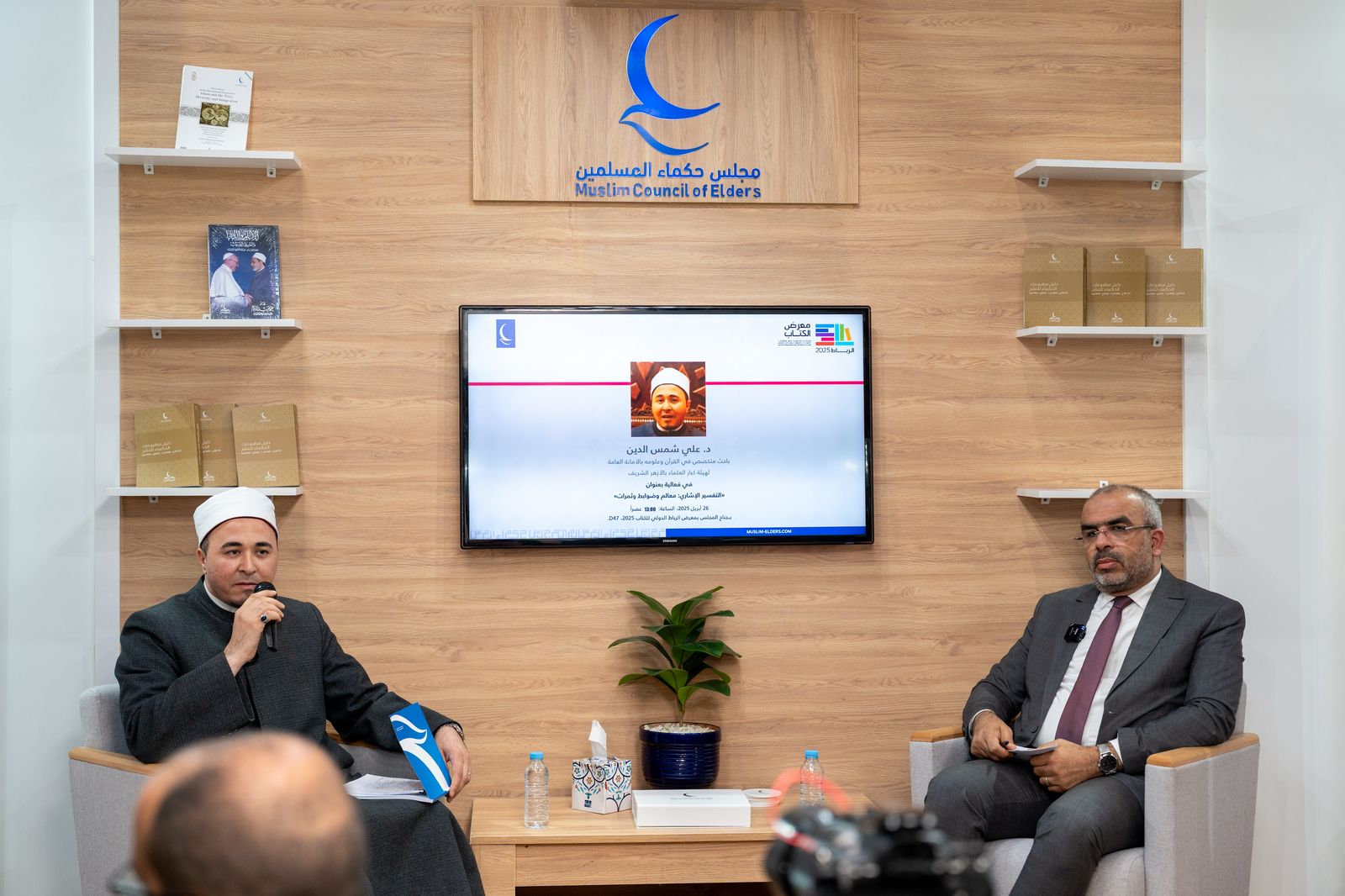Allusive Interpretation: Principles, Guidelines, and Fruits — A Seminar at the Muslim Council of Elders’ Pavilion, Rabat International Book Fair
Dr. Samir Boudinar: Allusive interpretation offers a fresh approach to Qur'anic exegesis, going beyond the apparent meanings to uncover subtle insights revealed through deep reflection on the Holy Qur’an
Dr. Ali Shams Al-Din: Among the fruits of allusive interpretation are sincere devotion to Allah, pure-hearted monotheism, refinement of the soul, and advancement in faith
As part of its cultural program at the 30th Rabat International Book Fair, the Muslim Council of Elders’ pavilion hosted a seminar titled "Allusive Interpretation: Principles, Guidelines, and Fruits." The seminar was moderated by Dr. Samir Boudinar, Director of Al Hokama Center for Peace Research, and presented by Dr. Ali Shams Al-Din, a specialist in Qur'anic studies at the General Secretariat of the Council of Senior Scholars at Al-Azhar.
Opening the session, Dr. Samir Boudinar emphasized that the topic of allusive interpretation has long served as a bridge between scholars of the East and West, captivating generations of scholars and specialists. He explained that allusive interpretation intersects with various fields, including the disciplines of hermeneutics, Qur'anic studies, Arabic language sciences, and the fields of Sufism. Dr. Boudinar described it as a revitalization of Qur’anic interpretation — one that moves beyond surface meanings to the deeper indications that become accessible through profound contemplation of the Holy Qur’an.
For his part, Dr. Ali Shams Al-Din explained that "allusive interpretation" derives its name from the concept of isharāt (subtle indications). Those who follow this approach are known as the "People of Indications" because they express the meanings they discern during their reading and meditation on the Qur'an through these insights. He noted that the term "allusive interpretation" is deliberately cautious, used by its proponents to acknowledge that true interpretation must adhere to proper foundations — drawing on authentic textual transmission, sound reasoning, and established linguistic norms.
Dr. Ali Shams Al-Din also outlined key aspects of the allusive interpretation of the Holy Qur’an, including its conditions, origins, major works, distinguishing features, and spiritual dimensions. He highlighted that Imam Al-Qushayri was the first scholar to author a major work dedicated specifically to allusive interpretation. He further noted that this method became particularly prominent among the Tabi‘un (the generation of Muslims who followed the Companions [Sahaba] of the Prophet Muhammad, peace be upon him) and their successors during the third and fourth centuries of the Hijri calendar.
Dr. Shams Al-Din emphasized that the fruits of allusive interpretation include cultivating sincere devotion to Allah, achieving pure and heartfelt monotheism, refining the soul, progressing in faith toward the station of Ihsan (spiritual excellence), elevating the spirit to the levels of mystical knowledge (‘irfan), and developing a deep, intuitive perception of hidden meanings while remaining firmly grounded in the recognized outward meanings based on the principles of Arabic linguistic tradition.
The Muslim Council of Elders’ Pavilion at the Rabat International Book Fair showcases over 250 diverse intellectual and cultural publications, including a number of its latest 2025 releases from Al-Hokama Publishing, addressing key contemporary intellectual and cultural issues. The Pavilion also hosts a series of cultural and scholarly events featuring prominent scholars, thinkers, authors, academics, and university professors, all in line with the Council’s vision and mission to promote peace and uphold the values of dialogue, tolerance, and human coexistence. The Council’s Pavilion is located in the Souissi District of Morocco’s capital, Rabat, at Stand D47.

